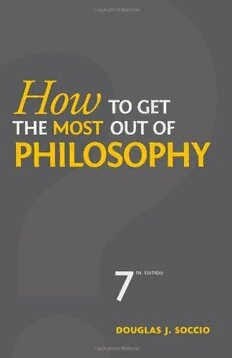
How to Get the Most Out of Philosophy PDF
Preview How to Get the Most Out of Philosophy
How to Get the Most Out of Philosophy SEVENTH EDITION DOUGLAS J. SOCCIO Australia • Canada • Mexico • Singapore • Spain United Kingdom • United States This is an electronic version of the print textbook. Due to electronic rights restrictions, some third party content may be suppressed. Editorial review has deemed that any suppressed content does not materially affect the overall learning experience. The publisher reserves the right to remove content from this title at any time if subsequent rights restrictions require it. For valuable information on pricing, previous editions, changes to current editions, and alternate formats, please visit www.cengage.com/highered to search by ISBN#, author, title, or keyword for materials in your areas of interest. © 2013 Wadsworth, Cengage ISBN-13: 978-1-133-05034-6 Learning ISBN-10: 1-133-05034-4 ALL RIGHTS RESERVED. No part of Wadsworth this work covered by the copyright 20 Channel Center Street herein may be reproduced, Boston, MA 02210 transmitted, stored, or used in any USA form or by any means graphic, electronic, or mechanical, including Cengage Learning is a leading but not limited to photocopying, provider of customized learning recording, scanning, digitizing, solutions with office locations taping, Web distribution, information around the globe, including networks, or information storage and Singapore, the United Kingdom, retrieval systems, except as Australia, Mexico, Brazil, and permitted under Section 107 or 108 Japan. Locate your local office of the 1976 United States Copyright at: www.cengage.com/global Act, without the prior written permission of the publisher. Cengage Learning products are represented in Canada by Nelson Education, Ltd. For product information and technology assistance, contact us at To learn more about Cengage Learning Customer & Wadsworth, visit Sales Support, www.cengage.com/wadsworth 1-800-354-9706 Purchase any of our products at For permission to use material from your local college store or at our this text or product, submit all preferred online store requests online at www.cengagebrain.com www.cengage.com/permissions Further permissions questions can be emailed to [email protected] Printed in the United States of America 1 2 3 4 5 6 7 15 14 13 12 11 For students everywhere— and their families This is your education. Customize it. Work at it. By enrolling in col- lege, you are accepting a personal invitation to participate in a “great conversation.”Plato characterized his teacher, the philosopher Socrates, as a guide who helped others climb out of the cave of ignorance. But Socrates, one of the greatest teachers of all time, always insisted that the teacher only “draws wisdom”out of the pupil—and only the pupil can provide the will. In the spirit of Socrates, I hope this book helps you on your own journey “out of the cave.” Contents PREFACE TO INSTRUCTORS (AND CURIOUS STUDENTS) vii A Lesson Learned the Hard Way: A Personal Note to Philosophy Students and Teachers viii New to the Seventh Edition x Soccio on the World Wide Web xi Introduction: What to Expect 1 1 Student Wisdom: Getting the Most Out of Yourself 3 What am I Doing Here? 4 Reality Check 6 The Need for Certification 8 How to Set and Achieve Realistic Goals 9 Time Management 10 Establish a Time Budget 11 2 Changing What You Can 12 False Comparisons 13 “Reach What You Cannot” 15 A College Education Is Worth the Effort 17 A Note of Encouragement for Part-Time Students 19 Student Wisdom Review 20 Going to College Is Like Buying Lettuce 23 The Biggest Avoidable Mistakes College Students Make 24 iv CONTENTS 3 Self-Respect and Academic Ethics 26 Campus Ethics 30 Plagiarism 34 Be Cool About Being Cool in School 36 4 How to Thrive in a Philosophy Class 38 Acquiring Informed Opinions 41 Special Features of Philosophy Courses 42 Getting the Most Out of a Philosophy (or any) Class 44 Deciding What is Noteworthy 46 Why Attendance Matters 49 Relating to Your Professor 50 Conferences with Your Professor 53 5 Reading Philosophy 55 Use Your Textbooks’ Organizational Features 57 The Virtues of Annotating Your Own Text 58 Quick Tips for Reading Philosophy (and Anything Else) 60 What to Do if Nothing Seems to Work 63 Beyond the Textbook 63 6 Developing a Critical Attitude 65 What is Uncritical Thinking? 68 What Does Critical Thinking Require? 70 Critical-Thinking Practices that Pay Off in the Classroom—and Beyond 71 7 Critical Writing 77 Three Critical Standards of Evidence 78 Basic Features of Good Critical Writing 79 Five Great Writing Tips 81 How to Pick a Topic 82 A Quick Guide to Getting Better Grades on Writing Assignments 84 Four Writing Samples for You to Grade 88 A Critical Look at the Four Sample Essays 91 Characteristics of Good and Bad Essays 92 A Handy Checklist for Better Critical Writing 95 v CONTENTS 8 Wisdom and the Internet 96 The University of Google 97 Facts, Information, and Knowledge 98 The Bachelor of Arts Degree in Wikipedia 100 Reliable Sources 102 A Note About “Distance Education” 105 9 The College of You 106 Five College Vices 107 Sloth 108 Greed 108 Anger 109 Envy 109 Pride 110 Three College Virtues 110 Diligence 111 Hope 112 Prudence 112 Conclusion 114 Appendix A: Simplified Style Guide for Excellent Papers 116 Citations 119 Constructing a List of Works Cited 120 A Sample Works Cited 124 Appendix B: Test Taking 126 Preparing for Tests 126 Relaxation Techniques for Better Test Scores 128 How to Do Your Best on Essay Tests 129 How to Do Your Best on Completion Tests 132 How to Do Your Best on Objective Tests 133 How to Do Your Best on Combination Tests 137 Appendix C: Letters of Recommendation 138 Beginning Philosopher’s Bibliography 142 Philosophically Oriented Study Books 142 Philosophy Reference Books 143 Study Skills Books 144 Eight Guides to Better Writing 145 Philosophy Online 146 Online Study Skills and Resources 148 vi
